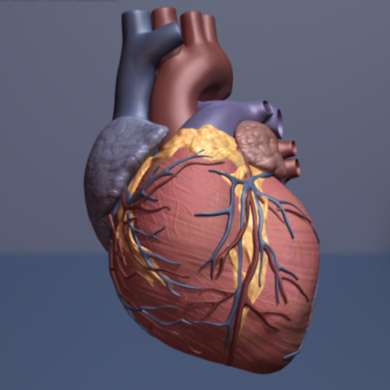Smartphone app could be used to test for potentially fatal irregular heart rate

A smartphone app, combined with a hand-held wireless single lead heart monitor (ECG), could feasibly be used to test for irregular heart rate, a potentially fatal condition known as atrial fibrillation or AF for short, suggests research published online in the journal Heart.
The method is cheap and accessible and so might be particularly useful for systematic mass screening, given that the condition was silent in around two thirds of newly diagnosed cases, suggest the researchers.
AF is associated with a heightened risk of stroke, heart failure, and death, and its prevalence is predicted to triple in the USA by 2050, because it is increasingly more common after the age of 65. But appropriate treatment can cut the risk of a stroke by up to 70%.
The researchers tested more than 13,000 adults in Hong Kong for atrial fibrillation between May 2014 and April 2015, using a smartphone app combined with a hand-held, wireless, single lead heart monitor (ECG).Participants were recruited to this community screening programme as a result of media campaigns and posters in community hubs.
The test, which lasted 30 seconds, picked up 101 cases (0.8%) of AF that had not been diagnosed before. In two thirds of these cases, the condition was symptomless, but their combined risk scores topped 3, suggesting that they would have benefited from treatment.
The result was uninterpretable in only 56 (0.4%) of those tested.
Overall, almost one in 10 (8.5%) of those tested had AF—a prevalence that is comparable with that of populations in developed countries. Increasing age (60+), male sex, weight, and a history of heart disease/surgery and peripheral vascular disease were all predictive of the condition.
Current guidelines recommend opportunistic screening for AF, but the researchers suggest that their findings indicate that systematic mass screening might instead be feasible.
"A systematic population-based ECG screening for AF, instead of an opportunistic approach, as recommended by the current [European Society of Cardiology] guidelines, may lead to a reduction in the incidence of stroke in the community," they conclude, advocating the need for a well designed clinical trial to test this out.
A linked editorial by Swedish cardiologists, Drs Emma Svennberg and Engdahl, from, respectively, the Karolinska Institute and the Sahlgrenska Academy at Gothenburg University, agree that the findings are important, but they sound a note of caution.
Systematic mass screening programmes for AF have not achieved coverage of more than 50% when targeted at those most at risk—uptake that is lower than most other established screening programmes, they say. And while the results are promising, "much more data on the optimal mode and duration of ECG recording are needed."
They go on to say that a major drawback of the research is the lack of data on the proportion of people who received appropriate medication (anticoagulants) after their test, pointing out that screening alone does not afford protection against the risk of stroke.
"In order to relieve both patients and society from the consequences of untreated AF, we believe and hope that AF screening in risk groups will be a part of the standard healthcare in many countries in the near future," they write.
"Besides, isn't it encouraging that we can use our smartphones to search for other things than Pokémons?" they add.
More information: Ngai-yin Chan et al. Screening for atrial fibrillation in 13 122 Hong Kong citizens with smartphone electrocardiogram, Heart (2016). DOI: 10.1136/heartjnl-2016-309993















